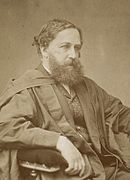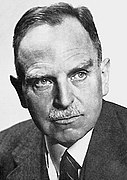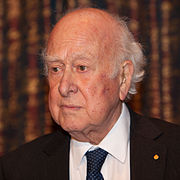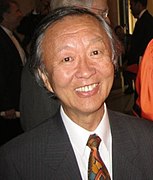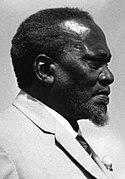University College London
University College London (branded as UCL[8][9][10]) is a public research university in London, England. It is a member institution of the federal University of London, and is the second-largest university in the United Kingdom by total enrolment[11] and the largest by postgraduate enrolment.
Other name
UCL
London University (1826–1836)
University College, London (1836–1907)
University of London, University College (1907–1976)
University College London (1977–2005; remains legal name)
Latin: Cuncti adsint meritaeque expectent praemia palmae
Let all come who by merit deserve the most reward
1826
(University status 2023)
£156.8 million (2023)[2]
£1.933 billion (2022/23)[2]
Victor L. L. Chu[3]
Anne, Princess Royal
(as Chancellor of the University of London)
9,585 (2021/22)[5]
6,075 (2021/22)[5]
46,830 (2021/22)[6]
23,800 (2021/22)[6]
23,030 (2021/22)[6]
895 (studying wholly overseas; 2021/22)
Urban
Established in 1826 as London University (though without university degree-awarding powers) by founders inspired by the radical ideas of Jeremy Bentham, UCL was the first university institution to be established in London, and the first in England to be entirely secular and to admit students regardless of their religion.[12][13] It was also among the first university colleges to admit women alongside men in 1878, two years after University College, Bristol.[14] Intended by its founders to be England's third university, politics forced it to accept the status of a college in 1836, when it received a royal charter and became one of the two founding colleges of the University of London, although it achieved de facto recognition as a university in the 1990s and formal university status in 2023. It has grown through mergers, including with the Institute of Ophthalmology (in 1995), the Institute of Neurology (in 1997), the Royal Free Hospital Medical School (in 1998), the Eastman Dental Institute (in 1999), the School of Slavonic and East European Studies (in 1999), the School of Pharmacy (in 2012) and the Institute of Education (in 2014).
UCL has its main campus in the Bloomsbury area of central London, with a number of institutes and teaching hospitals elsewhere in central London and has a second campus, UCL East, at Queen Elizabeth Olympic Park in Stratford, East London. UCL is organised into 11 constituent faculties, within which there are over 100 departments, institutes and research centres. UCL operates several museums and collections in a wide range of fields, including the Petrie Museum of Egyptian Archaeology and the Grant Museum of Zoology and Comparative Anatomy, and administers the annual Orwell Prize in political writing. In 2022/23, UCL had a total income of £1.93 billion, of which £527 million was from research grants and contracts.[2] The university generates around £10 billion annually for the UK economy, primarily through the spread of its research and knowledge (£4 billion) and the impact of its own spending (£3 billion).[15]
UCL is a member of numerous academic organisations, including the Russell Group and the League of European Research Universities, and is part of UCL Partners, the world's largest academic health science centre.[16] It is considered part of the "golden triangle" of research-intensive universities in southeast England.[17] UCL has publishing and commercial activities including UCL Press, UCL Business and UCL Consultants.
UCL has many notable alumni, including the founder of Mauritius, the first Prime Minister of Japan, one of the co-discoverers of the structure of DNA, and Coldplay members. UCL academics discovered five of the naturally occurring noble gases, discovered hormones, invented the vacuum tube, and made several foundational advances in modern statistics. As of 2022, 30 Nobel Prize winners[18] and three Fields medallists[19] have been affiliated with UCL as alumni or academic staff.
University College London (Transfer) Act 1905
5 Edw. 7. c. xci
11 July 1905
Organisation and administration[edit]
Governance[edit]
The two main bodies in UCL's governance structure are the council and the academic board, both of which are established by the royal charter and with powers defined by the statutes.[148] There is also a University Management Committee, which is the executive committee responsible for the day-to-day operations of the institution. This comprises the President and Provost, the vice-presidents, the vice-provosts, the pro-provost of UCL East, the deans of the faculties, the chief financial officer, chief information officer, and chief people officer, the chief of staff, the general consul, the executive director of media and marketing, and the director of media relations.[149]
The senior leadership team at UCL includes the visitor, a position in English charity law that overseas the operation of the institution.[150] That there shall be a visitor of the college is specified by the royal charter, as is that the position is to be held by the Master of the Rolls, the second most senior judge in England and Wales.[148]
UCL's council comprises 20 members, of whom 11 are members external to UCL; seven are UCL academic staff, including the provost, three UCL professors and three non-professorial staff; and two are UCL students. The chair is appointed by council for a term not normally exceeding five years. The chair is ex officio chair of the honorary degrees and fellowships committee, nominations committee and remuneration and strategy committee.[151] As of April 2023, the chair of the council is international businessman and UCL alumnus Victor Chu.[3]
The academic board plays a role similar to the senate in other institutions. It is the senior academic body responsible for advising council on academic matters and also elects academic members to council. It is, however, a much larger body than the senates at many other universities, including all professors as well as elected representatives of other academic and non-academic staff.[148][152]
UCL's principal academic and administrative officer is the President and Provost, who is also UCL's designated accountable officer for reporting to the Office for Students on behalf of UCL.[153] The provost is appointed by Council after consultation with the academic board, and is ex officio a member of council and chair of the academic board.[154] As of April 2023, Michael Spence has been president and provost since January 2021, when he succeeded Michael Arthur.[155][156]
Vice-provosts are appointed by council on the recommendation of the provost or the academic board, to assist and advise the provost as required. The vice-provosts are members of the provost's senior management team. There are four vice-provosts (for education and student experience; health; research, innovation and global engagement; and faculties).[148][157] There are also four vice-presidents, who are also members of the senior management team but whose role and manner of appointment is not specified in the statutes, for strategy, external engagement, advancement and operations.[148][157]
The deans of UCL's faculties are appointed by the council and are members of the provost's senior management team. The deans' principal duties include advising the provost and vice-provosts on academic strategy, staffing matters and resources for academic departments within their faculty; overseeing curricula and programme management at faculty level; liaising with faculty tutors on undergraduate admissions and student academic matters; overseeing examination matters at faculty level; and co-ordinating faculty views on matters relating to education and information support.[151]
National rankings
9
8
6
17
9
22
UCL alumni include Francis Crick (co-discoverer of the structure of DNA),[307] Lord Herschell (Lord Chancellor of Great Britain),[308] William Stanley Jevons (an early pioneer of modern economics),[309] Charles K. Kao ("Godfather of broadband"),[310] Jomo Kenyatta (considered the "Founding Father" of Kenya)[311] and Joseph Lister (pioneer in the use of antiseptics in surgery).[312] Notable former staff include Hugh Gaitskell (leader of the Labour Party 1955–63),[313] Otto Hahn (pioneer of nuclear chemistry, discoverer of nuclear fusion and Nobel laureate),[18] Peter Higgs (proposer of the Higgs mechanism, which predicted the existence of the Higgs boson, and Nobel laureate),[18] A. E. Housman (classical scholar and poet, who wrote A Shropshire Lad while a professor at UCL),[314] Sir William Ramsay (discoverer of all of the naturally occurring noble gases)[315] and Klaus Roth (mathematician and Field's Medal winner).[316]
Nobel Prizes have been awarded to 30 UCL academics (including visiting academics) and alumni (16 in Physiology or Medicine, seven in Chemistry, five in Physics and one each in Literature and Economic Sciences) as well as three Fields Medals in Mathematics.[18][19]
In the 19th century UCL operated as a college, with many students taking individual lecture courses rather than studying for degrees.[317]
These included well-known alumni such as Mahatma Gandhi, who took English classes with Henry Morley in 1888–89,[318] and John Stuart Mill, who attended lectures on jurisprudence by John Austin.[319]

